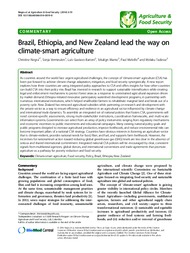Brazil, Ethiopia, and New Zealand lead the way on climate-smart agriculture.
Brazil, Ethiopia, and New Zealand lead the way on climate-smart agriculture.
Author(s): NEGRA, C.; VERMEULEN, S.; BARIONI, L. G.; MAMO, T.; MELVILLE, P.; TADESSE, M.
Summary: As countries around the world face urgent agricultural challenges, the concept of ?climate-smart? agriculture (CSA) has been put forward to achieve climate change adaptation, mitigation, and food security synergistically. A new report explores how three countries are using integrated policy approaches to CSA and offers insights for how other countries can build CSA into their policy mix. Brazil has invested in research to support sustainable intensification while creating legal and enforcement mechanisms to protect forest areas as a response to unrestrained agricultural expansion driven by market demand. Ethiopia initiated innovative participatory watershed development programs, in partnership with numerous international institutions, which helped smallholder farmers to rehabilitate marginal land and break out of a poverty cycle. New Zealand has removed agricultural subsidies while partnering on research and development with the private sector as a way to ensure efficiency and resilience in an agricultural sector influenced by climate change and international trade dynamics. To assemble an integrated set of national policies that fosters CSA, governments will need context-specific assessments, strong multi-stakeholder institutions, coordination frameworks, and multi-scale information systems. Governments can select from an array of policy instruments ranging from regulatory mechanisms and economic incentives to public investments and educational campaigns. Many existing national policy goals and public programs designed to increase agricultural production, improve livelihoods, and reduce environmental risks can become important pillars of a national CSA strategy. Countries have obvious interests in fostering an agriculture sector that is climate-resilient, provides national needs for food, fiber, and fuel, and supports farm livelihoods. However, the incentives for national-level action toward reducing global greenhouse gas (GHG) levels are less clear in the absence of serious and shared international commitment. Integrated national CSA policies will be encouraged by clear, consistent signals from multilateral agencies, global donors, and international conventions and trade agreements that promote agriculture as a pathway for poverty reduction and food security.
Publication year: 2014
Types of publication: Journal article
Observation
Some of Embrapa's publications are published as ePub files. To read them, use or download one of the following free software options to your computer or mobile device. Android: Google Play Books; IOS: iBooks; Windows and Linux: Calibre.
Access other publications
Access the Agricultural Research Database (BDPA) to consult Embrapa's full library collection and records.
Visit Embrapa Bookstore to purchase books and other publications sold by Embrapa.

